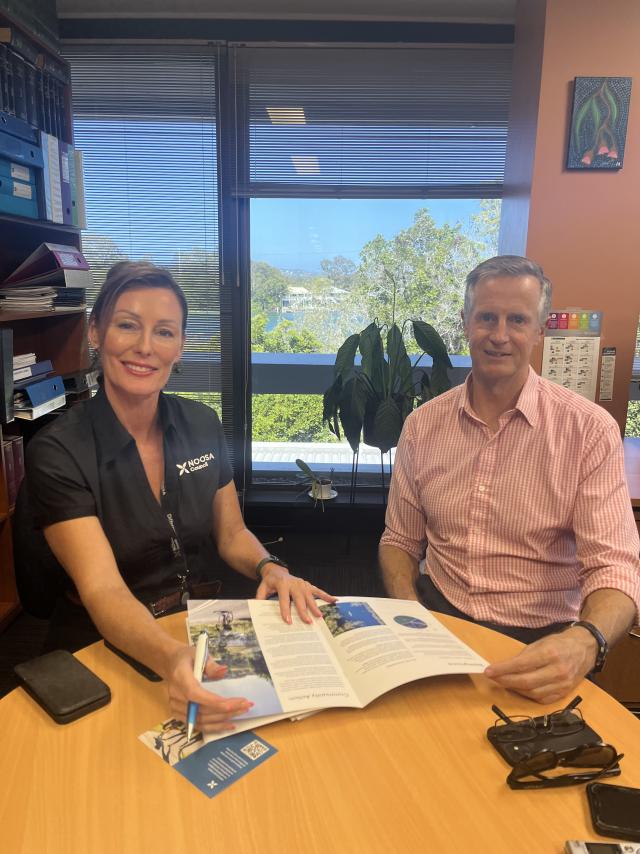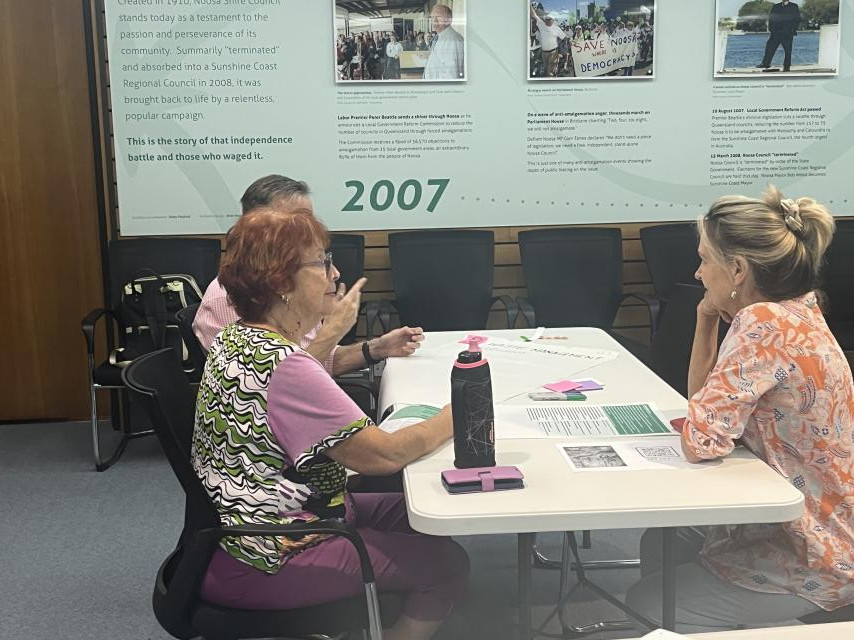NT: I think the scenarios are interesting, but to affect real change you have to change the mindset of the long time locals who think that nothing in their lives needs to change.
Caroline: I think that’s part of the conversation, talking through the challenges in protecting what we have, and the choices that are available to us. Choosing the right pathway to get where we want to go is a key part.
NT: I made a note when I was researching this: Is this about saving Noosa “from” tourism or “for” tourism?
Andrew: Another way of putting that is: Are we a community that lives in a tourism destination or a tourism destination that has a community? We’re thinking that the community comes first. And in taking that position, one of the things to consider is that the Noosa brand is very strong, so nothing the DMP might propose, none of it radical, would endanger tourism. Importantly, we’re not coming from the perspective that the relationship between tourism and the community is bad. In fact that relationship is much stronger than many other places, we just have to plan for the future.
NT: Have you looked at comparative situations around the world?
Andrew: Yes. If you scroll down on the Your Say page [Noosa Council website] you’ll see further reading which outlines some of the research we’ve done on places like Hawaii and New Zealand, and interesting projects like the Flinders Island “living lab” which is trying to align tourism with community values. One of the good parts of this research is that you come away thinking, we’re doing pretty well!
NT: Can you put me through the numbers? In the discussion paper you say that tourism represents 14 per cent of the labour force. Surely it’s more if you include food and beverages.
Andrew: Those things are hard to measure because tourism isn’t an economic sector by itself. The statistics we quote are from Economy ID which is part of the Bureau of Statistics data. But anecdotally you could get to 30 per cent by including restaurants and cafes. If you add the real estate industry you’d have close to half the population directly or indirectly involved in tourism.
NT: If you made that bold assumption that 50 per cent of us are making money out of tourism directly or indirectly, would that change the parameters of the DMP?
Andrew: No, it wouldn’t change at all. We want the community to have a say on the future direction of tourism, irrespective of the numbers. And unlike previous surveys, this cuts across other aspects, like waste management, traffic management, destination marketing and much more. It touches on all aspects of council business.
Caroline: What do you mean by changing the parameters?
NT: I mean if the assumption was that half the population is invested in tourism growth, then a DMP saying we should reduce growth or eliminate it might not be received very well.
Andrew: The clue here is the line we use on the cover: “Growing well together”. Growth is inevitable, but there are a lot of ways to look at managing it.
Caroline: Regenerative and sustainable growth are the keys. What we’re hearing from the community is that there is a reticence about growth but also an acknowledgement that it is inevitable.
NT: You describe regenerative tourism as leaving the destination better than you found it, which sounds to me like the impossible dream.
Andrew: It comes back to pushing your values as a community at every level. We love living here and we hope that you’ll love being here and look after it the way we do. That’s the message.
NT: Council’s waste department has told me that tourists are the worst waste offenders and the hardest to police or educate. They may have come from somewhere there is no consciousness about the problem, or they’re simply here on holiday and they think the rules do not apply.
Andrew: Which is clearly an opportunity for the community to lead the way in behavioural change.
NT: Let’s look at the four scenarios: do nothing. Do you expect anyone to agree with that?
Andrew: Some people will say that council should step back from some things, and because this is covering such a broad range of issues, from a governance perspective some people might tell us that we should pull back that involvement.
NT: Does that translate to people in the industry saying don’t get involved, let market forces work it out?
Andrew: We haven’t heard that yet, but we’re just coming into our first workshop.
NT: Steady state. Does that mean that we continue with what we’re doing, even with strategies that don’t work?
Andrew: It was originally called “business as usual”. It really means being reactive rather than proactive.
NT: But 84 per cent of respondents in the Liveability survey said that tourism was disrupting their lives.
Andrew: And tourism is a vital part of the DMP but it’s not all of it. We are looking at other things.
NT: Let’s move onto aspirational and transformational, which I take to mean let’s make changes slowly or let’s make them quickly. But in the latter you say profound change is what is meant. To me that implies a no growth position.
Andrew: No, that’s not what it means. Aspirational is a shorter time frame, transformational might be longer, say five to 10 years. One might lead to the other. Crawl before you can walk, so to speak. Aspirational to me means looking to the horizon, transformational means looking over the horizon. We didn’t see it in terms of less growth or more growth. We saw it as asking how far do you want us to pull those levers?
Caroline: We’ve talked a lot about the language around the scenarios, whether they range from a hard no to a maybe to a hard yes, but on the advice of the Project Control Group and others we decided to put it into a framework of things that might happen.
Andrew: That’s the crux of the discussion paper – how much change do you want?
NT: Is there a timeframe on getting the DMP out?
Andrew: If we get the quantity and quality of feedback we’re hoping for by the end of October, we’ll be meeting with council mid-November with a summary of the data and ideas, and if council is satisfied with that, we’d be looking to produce the DMP by mid-December. We could deep-dive under the elections and come out the other side, but we would prefer not to lose any impetus.










